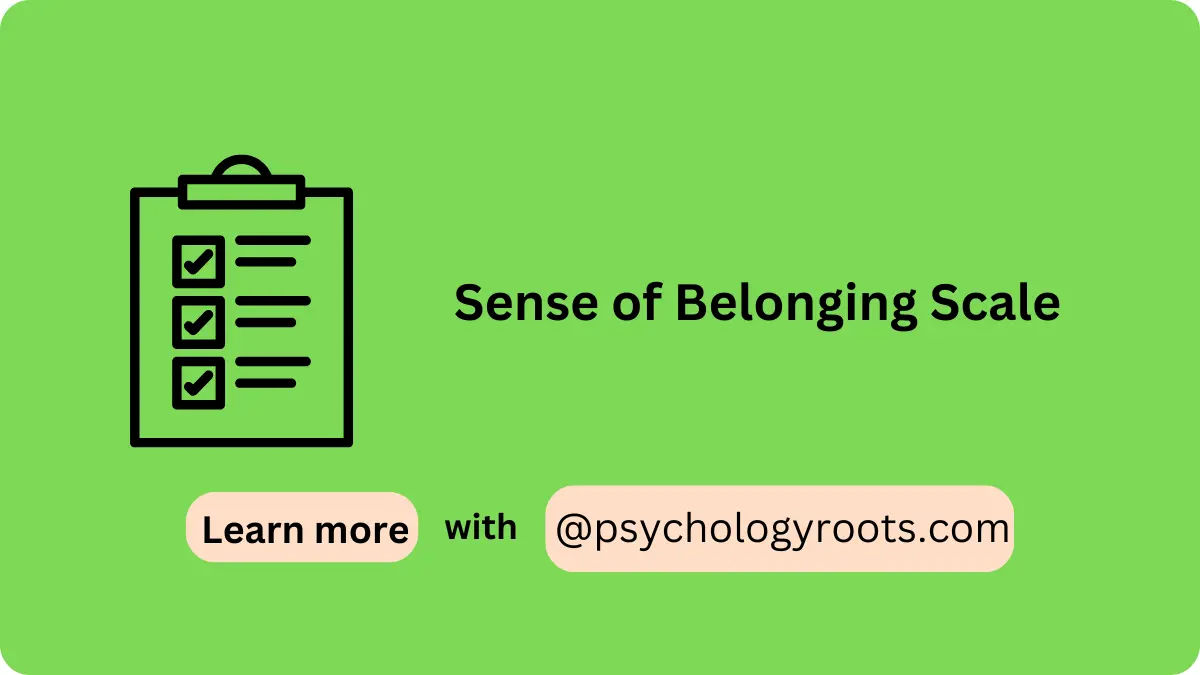Table of Contents
Sense of Belonging Scale
Here in this post, we are sharing the “Sense of Belonging Scale”. You can read psychometric and Author information. We have thousands of Scales and questionnaires in our collection (See Scales and Questionnaires). You can demand us any scale and questionnaires related to psychology through our community, and we will provide you with a short time. Keep visiting Psychology Roots.
About Sense of Belonging Scale
Scale Name
Sense of Belonging Scale
Author Details
Anderson-Butcher & Conroy
Translation Availability
English

Background/Description
The Sense of Belonging Scale evaluates an individual’s feelings of connection, commitment, support, and acceptance within a specific community program. It is particularly useful for youth attending programs such as sports, clubs, or other group activities.
This scale provides a quick and reliable method to gauge how well participants feel integrated and valued in their respective communities. By highlighting areas where belonging may be weak, it helps program organizers enhance participant experiences and foster a stronger sense of community.
Administration, Scoring and Interpretation
- Target Population: Youth aged 9–18 years (Grades 3–12).
- Preparation:
- Ensure participants are familiar with the response format and the meaning of each option.
- Clarify the importance of responding honestly based on their feelings.
- Instructions for Administrators:
- Explain the four-point Likert scale clearly
- Encourage respondents to circle the answer that best reflects their feelings.
- Emphasize that the strength of agreement or disagreement should guide their choice between uppercase and lowercase options.
Reliability and Validity
- Reliability: The scale demonstrates excellent internal consistency with an alpha score of .93.
- Validity: The scale has been validated in various community program settings, ensuring its utility in measuring belongingness among youth.
Available Versions
05-Items
Reference
Anderson-Butcher, D. S., & Fink, J. (2005). The Importance of A Sense of Belonging To Youth Service Agencies. Journal of Child and Youth Care Work, 20, 11-21.
Anderson-Butcher, D., & Conroy, D. E. (2002). Factorial and criterion validity of scores of a measure of belonging in youth development programs. Educational and psychological measurement, 62(5), 857-876.
Important Link
Scale File:
Frequently Asked Questions
Q1: What does the Sense of Belonging Scale measure?
It measures how connected, supported, committed, and accepted individuals feel in a community program.
Q2: Who can use this scale?
It is designed for youth aged 9–18 years (Grades 3–12) participating in programs like sports, clubs, or community activities.
Q3: Are there reverse-scored items in this scale?
No, none of the items require reverse scoring.
Q4: How are the scores interpreted?
Higher scores indicate a greater sense of belonging to the program.
Q5: Is permission required to use this scale?
No, permission is not needed to use the scale.
Disclaimer
Please note that Psychology Roots does not have the right to grant permission for the use of any psychological scales or assessments listed on its website. To use any scale or assessment, you must obtain permission directly from the author or translator of the tool. Psychology Roots provides information about various tools and their administration procedures, but it is your responsibility to obtain proper permissions before using any scale or assessment. If you need further information about an author’s contact details, please submit a query to the Psychology Roots team.
Help Us Improve This Article
Have you discovered an inaccuracy? We put out great effort to give accurate and scientifically trustworthy information to our readers. Please notify us if you discover any typographical or grammatical errors.
Make a comment. We acknowledge and appreciate your efforts.
Share With Us
If you have any scale or any material related to psychology kindly share it with us at psychologyroots@gmail.com. We help others on behalf of you.